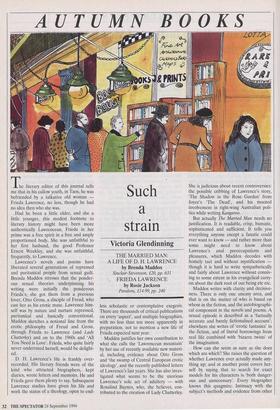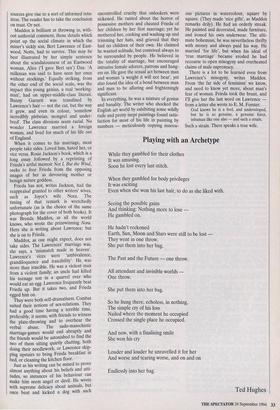AUTUMN BOOKS
Such a strain
Victoria Glendinning
The literary editor of this journal tells me that in his callow youth, in Taos, he was befriended by a talkative old woman Frieda Lawrence, no less, though he had no idea then who she was.
Had he been a little older, and she a little younger, this modest footnote to literary history might have been more authentically Lawrencean. Frieda in her prime was a free spirit in a free and amply proportioned body. She was unfaithful to her first husband, the good Professor Ernest Weekley, and she was unfaithful, frequently, to Lawrence.
Lawrence's novels and poems have liberated several generations of repressed and puritanical people from sexual guilt. Brenda Maddox stresses that the ponder- ous sexual theories underpinning his writing were initially the ponderous Frieda's; she got them from a previous lover, Otto Gross, a disciple of Freud, who cast her as his erotic muse. Lawrence him- self was by nature and nurture repressed, puritanical and basically conventional. Maddox sketches a notional line from the erotic philosophy of Freud and Gross, through Frieda to Lawrence (and Lady Chatterley) and on to the 1960s and 'All You Need is Love'. Frieda, who quite fairly never underrated herself, would be delight- ed.
D. H. Lawrence's life is frankly over- recorded. His literary friends were of the kind who attracted biographers, kept diaries, wrote letters and memoirs. He and Frieda gave them plenty to say. Subsequent Lawrence studies have given his life and work the status of a theology, open to end- less scholastic or contemplative exegesis. There are thousands of critical publications on every 'aspect', and multiple biographies, with no less than ten more apparently in preparation, not to mention a new life of Frieda expected next year.
Maddox justifies her own contribution to what she calls the `Lawrencean mountain' by her use of recently available new materi- al, including evidence about Otto Gross and 'the swamp of Central European erotic ideology', and the recently published letters of Lawrence's last years. She has also inves- tigated what seems to be the uxorious Lawrence's sole act of adultery — with Rosalind Baynes, who, she believes, con- tributed to the creation of Lady Chatterley. She is judicious about recent controversies: the possible cribbing of Lawrence's story, The Shadow in the Rose Garden' from Joyce's The Dead', and his mooted involvement in right-wing Australian poli- tics while writing Kangaroo.
But actually The Married Man needs no justification. It is readable, crisp, humane, sophisticated and sufficient. It tells you everything anyone except a fanatic could ever want to know — and rather more than some might need to know about Lawrence's anal preoccupations and pleasures, which Maddox decodes with homely tact and without mystification though it is hard to write sympathetically and fairly about Lawrence without conniv- ing to some extent in his evangelical carry- on about the dark root of our being etc etc.
Maddox writes with clarity and decisive- ness. There is only one uneasy area, and that is on the matter of who is based on whom in the fiction, and the autobiographi- cal component in the novels and poems. A sexual episode is described as a 'factually accurate and barely fictionalised account'; elsewhere she writes of 'erotic fantasies' in the fiction, and of literal borrowings from real life combined with 'bizarre twists' of the imagination.
How can she seem as sure as she does which are which? She raises the question of whether Lawrence ever actually made any- thing up; and at another point covers her- self by saying that to search for exact models for his characters is 'both danger- ous and unnecessary'. Every biographer knows this quagmire. Intimacy with the subject's methods and evidence from other sources give rise to a sort of informed intu- ition. The reader has to take the conclusion on trust. Or not.
Maddox is brilliant at throwing in, with- out authorial comment, those details which point up the social climate in which the miner's sickly son, Bert Lawrence of East- wood, Notts, had to survive. This may be best illustrated by her simple sentence about the scandalousness of an Eastwood woman, Alice CI gave Bert sex') Dax: 'A milkman was said to have seen her once without stockings.' Equally striking, from the other end of the social scale, was the impact this young genius, a real 'working- man', had on upper-middle-class literati. Bunny Garnett was transfixed by Lawrence's hair — not the cut, but the way it grew, and even its colour, 'somehow incredibly plebeian, mongrel and under- bred'. The class divisions seem racial. No wonder Lawrence married a foreign woman, and lived for much of his life out of England.
When it comes to his marriage, most people take sides. Loved him, hated her, or vice versa. Rosie Jackson's book, which is a long essay followed by a reprinting of Frieda's artful memoir Not I, But the Wind, seeks to free Frieda from the opposing images of her as devouring mother or benign nature goddess.
Frieda has not, writes Jackson, had the reappraisal granted to other writers' wives, such as Joyce's wife Nora. The timing of that remark is wretchedly unfortunate (as is the choice of the same photograph for the cover of both books). It was Brenda Maddox, as all the world knows, who wrote the prizewinning Nora. Here she is writing about Lawrence; but she is on to Frieda.
Maddox, as one might expect, does not take sides. The Lawrences' marriage was, she says, a 'mismatch made in heaven'. Lawrence's vices were 'ambivalence, grandiloquence and irascibility'. He was more than irascible. He was a violent man from a violent family; an uncle had killed his teenage son in a quarrel over who would eat an egg. Lawrence frequently beat Frieda up. But it takes two, and Frieda egged him on. They were both self-dramatisers. Combat suited their notions of sex-relations. They had a good time having a terrible time, preferably, it seems, with friends to witness the plate-throwing and to overhear the verbal abuse. The sado-masochistic marriage-games would end abruptly and the friends would be astonished to find the two of them sitting quietly chatting, both doing their needlework, or Lawrence skip- ping upstairs to bring Frieda breakfast in bed, or cleaning the kitchen floor. Just as his writing can be mined to prove almost anything about his beliefs and atti- tudes, so instances of his behaviour can make him seem angel or devil. He wrote with supreme delicacy about animals, but once beat and kicked a dog with such uncontrolled cruelty that onlookers were sickened. He ranted about the horror of possessive mothers and cheated Frieda of her children by her first marriage; yet he mothered her, cooking and washing up and trimming her hats, and grieved that they had no children of their own. He claimed he wanted solitude, but contrived always to be surrounded by people. He believed in the totality of marriage, but encouraged intrusive female adorers, patrons and hang- ers on. He gave the sexual act between man and woman 'a weight it will not bear', yet also found the idea of a bond between man and man to be alluring and frighteningly significant.
In everything, he was a mixture of genius and banality. The writer who shocked the English art world by exhibiting some wildly rude and pretty inept paintings found satis- faction for most of his life in painting by numbers — meticulously copying innocu- ous pictures in watercolour, square by square. (They made 'nice gifts', as Maddox remarks drily). He had an orderly streak. He painted and decorated, made furniture, and ironed his own underwear. The ulti- mate bohemian, he was nevertheless thrifty with money and always paid his way. He married 'for life', but when his ideal of `true marriage' became eroded he had recourse to open misogyny and overheated claims of male supremacy.
There is a lot to be learned even from Lawrence's misogyny, writes Maddox. From 'the far side of feminism' we know, and need to know yet more, about man's fear of woman. Frieda took the brunt, and I'll give her the last word on Lawrence from a letter she wrote to E. M. Forster:
God knows he is a fool, and undeveloped, but he is so genuine, a genuine force, inhuman like one also — and such a strain.
Such a strain. There speaks a true wife.



































































 Previous page
Previous page